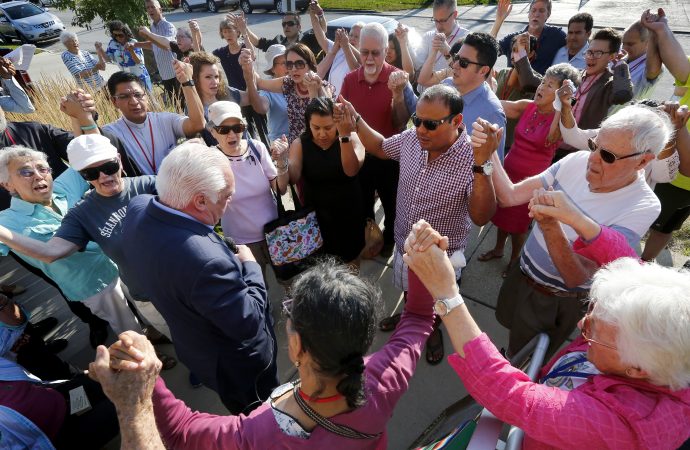
By Christopher White, National Correspondent
NEW YORK (Crux) — Parishes with vitality are ones open to their communities, comfortable with lay leadership, and prioritize a welcoming, missionary spirit throughout their programs according to a new study.
“Open Wide the Doors to Christ: A Study of Catholic Social Innovation for Parish Vitality,” released last week and published by Foundations and Donors Interested in Catholic Activities (FADICA) enumerates shared characteristics found in Catholic parishes with vital communities, which are described as ones with strong leadership and “a balance of Word, Worship, and Service in the life of the parish.”
The report utilizes a paradigm of Catholic Social Innovation (CSI) to examine programming and parish life, which the researchers define as “a response to the Gospel which brings together diverse stakeholders and perspectives to address difficult issues. These stakeholders enter a safe space and, open to the Spirit, utilize animating and transformative processes that can unlock and unleash the creative, innovative ability of the group to dialogue and develop new actionable responses.”
Researchers Marti Jewell and Mark Mogilka identified eight common characteristics of these communities: innovation; excellent pastors; dynamic leadership teams; a holistic, compelling vision; a priority on the Sunday experience; a fostering of spiritual growth and maturity; commitment to service; and utilization of online communication tools.
While the research for the study was conducted in 2019, the report’s release proves particularly timely given the fact that most parishes throughout the nation have been forced to innovate and utilize online platforms in the face of the COVID-19 pandemic, which has forced the temporary suspension of in-person religious gatherings.
“As parishes begin to re-open, we are pleased to be releasing the findings of this timely study,” said FADICA president and CEO, Alexia Kelley in a statement. “Perhaps one outcome from this period of pandemic could be that pastors and parish leaders equipped with the study’s findings might find life-giving strategies relevant to their own context.”
The study examines four major areas of parish life – welcoming parishes, young adults, women and women religious in leadership, and Hispanic Ministry – and is the product of a survey of more than 200 initiatives, websites, and books, along with interviews with over 65 pastoral leaders throughout the United States.
Among the common attributes of welcoming parishes are ones that have an engaging website, trained greeters to welcome individuals to Mass, a focus on hospitality, and systems in place to follow-up with newcomers.
In examining successful parish life programing for young adults, researchers found the need to have young adult representation in all ministries and leadership groups within the parish, regular listening sessions in order to know and respond to their needs, and creative programs for marriage preparation and first communion that are hospitable to young families.
When it comes to women’s leadership, the report notes that “without exception, interviewees noted that women hold the majority of the more than 40,000 full and half-time paid staff positions and are the backbone of parish life.”
Although the researchers noted that progress has been made, they observe that there are many occasions when women are discouraged from leadership. They recommend that parishes ensure a balance of women and men on parish councils and committees and note that women and women religious should be named to more diocesan positions such as chancellors, departmental director, and advisors to the bishop.
Further, they recommend that canon 517.2 under Church law be employed, which allows a bishop, where there is a lack of clergy, to appoint “deacons and other persons who are not priests” to provide for the pastoral care of parishes.
As Hispanic Catholics are approaching a majority population of U.S. Catholics – and are already a majority among millennial Catholics – the report finds that “the need for the Church community to significantly increase the number of programs and initiatives that welcome these communities is critical.”
Successful parishes have bi-lingual websites and faith formation literature, see parish diversity as a benefit and grace, active listening and integration efforts, and “adamant about the imperative to provide cultural sensitivity and competency training for both Anglo and Hispanic leaders.”
Going forward, the researchers conclude that simply doing more of what has worked in the past will not work, neither will relying on clergy alone for vital parish life.
“We found lay women and lay men working together with clergy, co-responsibly stepping up and bringing life to the parish. We saw them more welcoming than aloof. We found leaders open to personal, flexible, and adaptive relationships with young adults, rather than bemoaning or blaming the culture. And rather than seeing diversity as an obstacle, leaders welcome it as a grace, embracing our brothers and sisters of every culture and ethnicity,” they write.
By embracing co-responsibility and diversity, they conclude, parishes and pastoral leaders will find new ways to “Open Wide the Doors of Christ,” both “literally and figuratively.”
